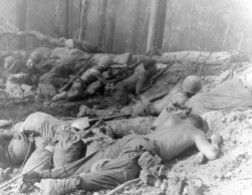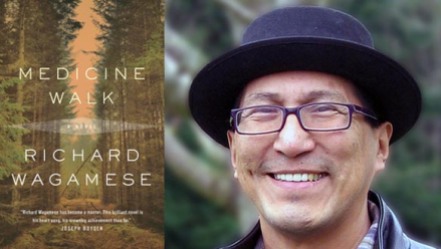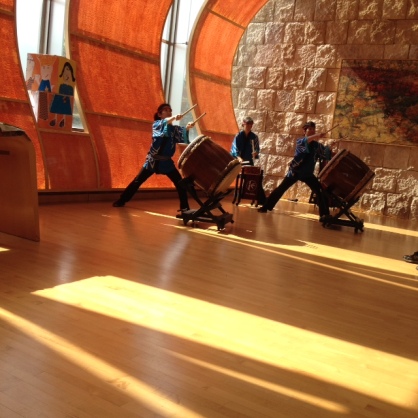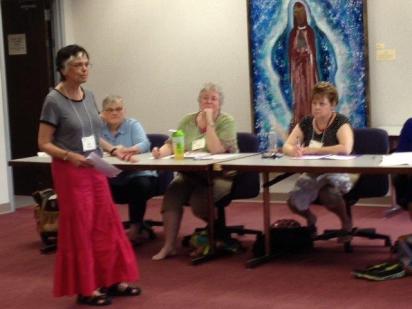“When you share stories you change things.” Medicine Walk by Richard Wagamese is a novel that is all about stories.

Wagamese takes us to the wilds of British Columbia sometime around the turn of the 21st century, and to anOjibway family. A 16 year old boy desperately needs to hear his father’s stories, and the father must share them if he is to find any peace. But will he be able to do so? And if he manages to begin, will he be able to finish? And how much will we be changed as we are drawn into an existential world we all recognize: a yearning to know ourselves, to know others, to make sense of life and to belong?
“The kid,” Wagamese’s protagonist, lives largely in a world of silence and beauty. The 16 year old spends weeks alone in the hills farming, and knows every detail of the creeks, hills, plants, birds and beasts.
He was big for his age, raw-boned and angular…he’d grown comfortable with aloneness and he bore an economy with words that was blunt, direct, more a man’s talk than a kid’s…. The old man had taught him the value of work early and he was content to labour, finding his satisfaction in farm work and his joy in horses and the untrammeled open of the high country…and if he was taciturn he was content in it, hearing symphonies in the wind across a ridge and arias in the screech of hawks and eagles, the huff of grizzlies and the pierce of a wolf call against the unblinking eye of the moon. He was Indian.
But this boy, who knows the life of the wild so well, does not know himself because of “a hole in his history.” He does not know where he came from how he got his name – both extremely important for First Nations peoples. He lives with “the old man” who has taught him how to survive, but he does not know who the old man is. He does know he has a father, a man who enters the boy’s life for just a moment about every three years. A drunk, a liar and a man of broken promises, the father appears just long enough to break the boy’s heart one more time. Most of all he wants to know about his mother. Could she be the woman he saw in town?
When he is 16, the boy gets a request from his father to come to him and reluctantly saddles up a horse to begin the long trek to the city. He has been summoned before with promises that led only to bitter disappointment. Now he finds his father in skid row, drunk, in bed with a woman and guzzling “hooch.” This is nothing new. But this time his father is clearly very sick; he tells the boy he is dying. The kid needs to know more.
“How do you know you’re getting ready to die?”
“The liver,” [his father] said. “She’s shot. All kinds of crap making its way into my body now.”
“From drinking, I suppose.”
“Yeah.”
His request? That the kid take him up to the ridge and bury him like a warrior – sitting up and facing East.
Like a warrior?? Angry, disgusted, the kid walks out, slams the door. But duty speaks louder than anger, “he’s my father,” and so he returns, and they begin the “medicine walk.”
The father knows he owes his son stories. But can he bear to tell them? It will be a long walk through the wild. The two proceed very slowly: the father tied into his saddle, drinking, the kid walking, making camp, hunting for food, starting out again.

The 16 year old is frightened, not knowing whether he can handle what will happen. He is angry and wonders whether, or how much, his father will tell him before he dies. How much of the hole in his history will this sick, drunken man fill in? Will he learn anything that explains his father’s story? Will he ever know the meaning of his name? Who the old man is? Will he know about his mother? Who she is? Where she is? Or will his father take her story to his grave also?
The dying man’s stories come in small pieces, slowly. Stories of love and great loss, stories of war, stories of the joy of the rhythm of work, of brief well being followed by betrayal, self-destruction, self-loathing and “the drink.”
In between the pieces of story there is silence and the kid’s occasional angry “plain speech” wrapped in his gloriously gentle, loving care of the man he begins to think of as “dad.” Each bit of story helps the boy. But death is approaching his father rapidly. How far will he find out? Will he ever hear anything about his mother?
Wagamese is a poetic story teller whose magnificent portrayals of British Columbian wilds frame the internal worlds of the kid and the torturous yet beautiful medicine walk of father and son. There are longing and mystery, tears, horror and sweetness for the reader.
Richard Wagamese is a prolific Canadian writer. An Ojibway himself, living outside of Ontario, he has worked in many venues. He has authored 13 books, one of which, One Story, One Song, was awarded the George Ryga Award for Social Awareness in Literature. He is also known as a newspaper columnist, broadcaster on both radio and television and a documentary producer.
The author uses great detail to transport us to the wilds of British Columbia, but his style is so sensual, with phrases full of forward motion, that I never became bogged down or bored. The story was always on the move, like the medicine walk, replete with vivid pictures of the kid and of his world:
His life had become horseback in solitude, lean-tos cut from spruce, fires in the night, mountain air that tasted sweet and pure as spring water, and trails too dim to see that he learned to follow high to places only cougars, marmots, and eagles knew.
Medicine Walk is the story of one Ojibway family and yet a story for all. Ancestors, family heritage, the giving and meaning of names have paramount importance in First Nations. Stories pass on not only this rich heritage, instilling a healthy pride in one’s identity; they also create community, entertain and transmit time–tested ways of surviving physically, emotionally and spiritually.
Some of the richness of heritage and storytelling has probably been lost by those more familiar with highly individualized cultures where “reinventing oneself” is a regular undertaking. Nevertheless our hearts resonate to the importance of “where we come from.” And somehow we know that the television set has not satisfactorily replaced the telling of stories in the evening, when the day’s work is done and we sit together around the fireside or out on the porch.

Medicine Walk is a captivating book because it is a captivating story beautifully told. It makes us afraid, angry, disgusted, hopeful, and terribly sad at different moments. It is a redemptive story, but one that allows scarring to remain. Neither the son nor the father can bring back the years lost. Great losses and pain leave scars on us. Sometimes scars equip us to give more to others. In any case, to ignore or wipe them away renders a story shallow.
Medicine Walk is a tale about a 16 year old Ojibway boy and a drunken father, it is also, somehow, our story. Because of this, reading Medicine Walk is medicine for us as well.
What journey by plane, boat, bike or just your feet have you made that has changed you?






